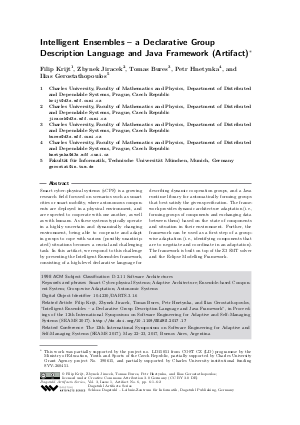Intelligent Ensembles – a Declarative Group Description Language and Java Framework (Artifact)
Authors Filip Krijt, Zbynek Jiracek, Tomas Bures, Petr Hnetynka, Ilias Gerostathopoulos
-
Part of:
Issue:
Special Issue of the 12th International Symposium on Software Engineering for Adaptive and Self-Managing Systems (SEAMS 2017)
Part of: Volume: DARTS, Volume 3 (ECOOP 2017)
Part of: Journal: Dagstuhl Artifacts Series (DARTS) - License:
 Creative Commons Attribution 3.0 Germany license
Creative Commons Attribution 3.0 Germany license
- Publication Date: 2017-05-16
Artifact Description

PDF
DARTS.3.1.6.pdf
- Filesize: 368 kB
- 3 pages
Document Identifiers
Subject Classification
Keywords
- Smart Cyber-physical Systems; Adaptive Architecture; Ensemble-based Component System; Group-wise Adaptation; Autonomic Systems
Metrics
- Access Statistics
-
Total Accesses (updated on a weekly basis)
0PDF Downloads0Metadata Views
Abstract
Smart cyber-physical systems (sCPS) is a growing research field focused on scenarios such as smart cities or smart mobility, where autonomous components are deployed in a physical environment, and are expected to cooperate with one another, as well as with humans. As these systems typically operate in a highly uncertain and dynamically changing environment, being able to cooperate and adapt in groups to cope with various (possibly unanticipated) situations becomes a crucial and challenging task. In this artifact, we respond to this challenge by presenting the Intelligent Ensembles framework, consisting of a high-level declarative language for describing dynamic cooperation groups, and a Java runtime library for automatically forming groups that best satisfy the given specification. The framework provides dynamic architecture adaptation (i.e., forming groups of components and exchanging data between them) based on the state of components and situation in their environment. Further, the framework can be used as a first step of a group-wise adaptation (i.e., identifying components that are to negotiate and coordinate in an adaptation). The framework is built on top of the Z3 SMT solver and the Eclipse Modelling Framework.
Cite As Get BibTex
Filip Krijt, Zbynek Jiracek, Tomas Bures, Petr Hnetynka, and Ilias Gerostathopoulos. Intelligent Ensembles – a Declarative Group Description Language and Java Framework (Artifact). In Special Issue of the 12th International Symposium on Software Engineering for Adaptive and Self-Managing Systems (SEAMS 2017). Dagstuhl Artifacts Series (DARTS), Volume 3, Issue 1, pp. 6:1-6:3, Schloss Dagstuhl – Leibniz-Zentrum für Informatik (2017)
https://doi.org/10.4230/DARTS.3.1.6
BibTex
@Article{krijt_et_al:DARTS.3.1.6,
author = {Krijt, Filip and Jiracek, Zbynek and Bures, Tomas and Hnetynka, Petr and Gerostathopoulos, Ilias},
title = {{Intelligent Ensembles – a Declarative Group Description Language and Java Framework (Artifact)}},
pages = {6:1--6:3},
journal = {Dagstuhl Artifacts Series},
ISSN = {2509-8195},
year = {2017},
volume = {3},
number = {1},
editor = {Krijt, Filip and Jiracek, Zbynek and Bures, Tomas and Hnetynka, Petr and Gerostathopoulos, Ilias},
publisher = {Schloss Dagstuhl -- Leibniz-Zentrum f{\"u}r Informatik},
address = {Dagstuhl, Germany},
URL = {https://drops.dagstuhl.de/entities/document/10.4230/DARTS.3.1.6},
URN = {urn:nbn:de:0030-drops-71444},
doi = {10.4230/DARTS.3.1.6},
annote = {Keywords: Smart Cyber-physical Systems; Adaptive Architecture; Ensemble-based Component System; Group-wise Adaptation; Autonomic Systems}
}
Author Details
Artifact
DARTS-3-1-6-artifact-b2cb477b115a1be8a9db2a71d96d8ebb.tgz
(Filesize: 0.83 GB)
MD5 Sum:
b2cb477b115a1be8a9db2a71d96d8ebb
(Get MD5 Sum)
